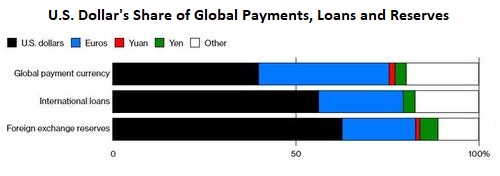Could A Cryptocurrency Become A Global Reserve Currency?
Could a non-state cryptocurrency like bitcoin become a global reserve currency? I first proposed the idea back in November 2013, long before bitcoin's rise to $19,000, decline to $3,200, recent ascent to $13,000 and current retrace.
The idea is intriguing on a number of levels. In terms of retaining value through thick and thin, the ultimate reserve currency cannot be printed (and thus devalued) with abandon by a government. Gold and silver have served as the ultimate reserve currency, as precious metals can be traded for commodities and services, provide collateral for debt and serve as reliable stores of value.
While many observers believe gold is still the only reliable reserve currency (or if you prefer, the only reliable backing for government-issued paper money), it's a worthy thought experiment to ask if a digital currency could also act as a reserve currency.
Since there is no real-world commodity backing the digital currency, its value must be based on scarcity and its ubiquity as money. The two ideas are self-reinforcing: there must be demand for the digital money to create scarcity, and the source of demand is the digital currency's acceptance as money that can be used to buy commodities, goods, services, and (the ultimate test) gold.
It follows that the first step in a non-state issued digital currency becoming a reserve currency is that it isn't created in quantities that dwarf demand. If the digital currency is issued with abandon, it cannot be scarce enough to gain any value. If I own one quatloo (our hypothetical digital currency) and a trillion new quatloos are issued tomorrow, the value of my one quatloo will decline to near-zero.
The second step is its widespread acceptance globally as money, i.e. a store of value and something which can be traded for goods and services.
There is a bit of a built-in conflict in these two requirements. To be useful in the $60 trillion global economy, the quatloo must be issued in size: there must be enough of it around to grease transactions large and small in all sorts of markets. Using the U.S. dollar as a guide (since the USD is the primary reserve currency), we can estimate that a minimum of $1 trillion in quatloos would be needed to become a practical global currency.
To act as a reserve currency, another trillion or two would be needed, as nations would hold these quatloos as reserves. (Nations hold an estimated $7 trillion in USD reserves, about $3 trillion euros and $1 trillion or so in yen, pounds and other currencies.)
But issuing quatloos in these quantities would remove any scarcity value. Thus the issuer of the quatloo would have to carefully issue more quatloos only when demand justified the need for more monetary "grease" for the global economy.
If on the other hand skyrocketing demand/scarcity drove the value to the stratosphere, holders of the quatloo would rejoice, but this volatility would present its own set of risks for those seeking to use the quatloo as a reserve against currency volatility in the home-country currency. If a digital currency can leap ten-fold in a short time, then might it not drop with equal volatility?
Volatility is the enemy of reserves; the holder of reserves needs a liquid (meaning it can easily be sold or traded in size) currency that predictably retains its value. A volatile currency poses risks, as do currencies that cannot be traded in size without drastically influencing the market value of the currency.
These conditions pose a steep challenge for any cryptocurrency, but they are not insurmountable. Even as a niche currency, non-state issued digital currencies could play a role in the global economy, especially if government-issued fiat currencies destabilize/ devalue due to massive money creation by desperate central banks and state treasuries.
Is scarcity enough to back a non-state issued currency? Bitcoin offers a real-world experiment.
As for Facebook's proposed Libra digital currency--it's simply state-issued fiat currency in a corporate package. Libra will be backed by state-issued fiat currency, so it's nothing but a corporate-controlled proxy for all the unbacked, prone-to-hyperinflation state currencies.
Will bitcoin appear on this chart of global reserve currencies in the future? How would Venezuela or Zimbabwe have fared had they invested some of their reserves in bitcoin in 2013, or even 2016? Much better than they did attempting to launch a state-controlled digital currency (Venezuela) or relying on the printing press.
(Click on image to enlarge)

Disclosures: None.




Simple answer is no.
Why do youthink that?
Too many questions, from security to governments eventually regulating it if it gets too popular.
There's so much to say about #crytpocurrencies but in brief, it isn’t tangible, you can’t store it yourself & it can be hacked.
It's true, people think #blockchain means secure. But exchanges can and do get hacked all the time. And most tokens are pure scams. In fact this just happened yet agaiin:
talkmarkets.com/.../exit-scam-cryptocurrency-exchange-bitsane-vanishes-with-users-funds
Government currency appears far more stable than Bitcoin, doesn't it? The dollar is hardly prone to hyperinflation. Bitcoin's worth is massively volatile.
What about the concept of a stable coin. For example #Facebook's new #Libra. $FB.
Yes, as long as the corporation guarding it is secure. Not sure if Facebook could be that secure based on its record. That is for experts in the field.
Anything is hackable. Including #Facebook. $GB